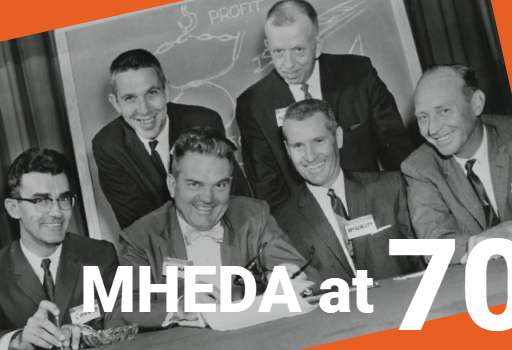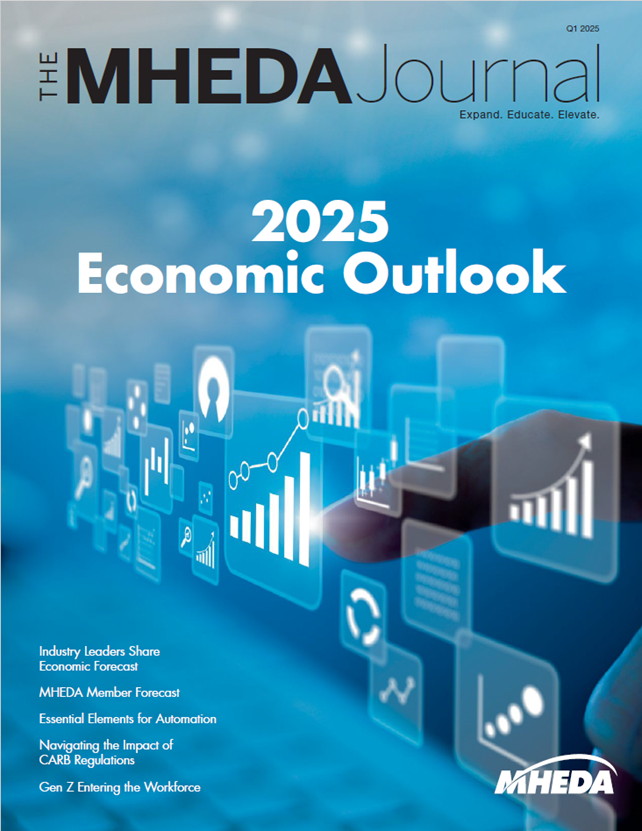MHEDA at 70
By Nick Fortuna
According to Google, one of the most significant events of Oct. 10, 1954, was the birth of David Lee Roth, the energetic frontman of the iconic rock band Van Halen. But to anyone connected to the material handling industry, that date in history provides a much bigger reason to “Jump” than that.
On that day 70 years ago, executives from eight forklift distributors met at the Morrison Hotel in Chicago to form a trade association. At the time, manufacturing in the United States was booming following the end of World War II, and demand for material handling equipment was rising sharply.
Those distributors – A.C. Andrews of A.C. Andrews Co.; Robert G. Arnold of Arnold Machinery Co.; Albert Bode of The Bode-Finn Co.; Art Canfield of M.E. Canfield Co.; C.H. “Bud” Ellis of C.J. Ellis Co.; Harry W. Embry Jr. of Embry Brothers Inc.; George E. Furnival of Furnival Machinery Co.; and L.J. Johnstone of Lewis Johnstone Co. – formed the Material Handling Equipment Distributors Association, an organization that’s been serving members for seven decades now.
Today, MHEDA represents over 600 leading material handling companies from across North America. Our members are distributors, solution providers, manufacturers and suppliers for industrial truck, storage and handling and systems integration companies. For the past 70 years, the association has provided member companies and their thousands of employees with business resources, leadership training, networking opportunities, benchmarking data, career development tools and insights on the latest industry trends.
Mark M. Milovich, president of Lift Atlanta Inc., said MHEDA has managed to maintain its membership despite a number of smaller members being acquired by larger competitors, illustrating the value the association provides to members.
“The association has always focused on what’s best for members,” Milovich said. “MHEDA is very well respected not only within our industry but among trade associations. I don’t know how many different associations we’ve talked with that have looked at us as a model of how to run a trade association.
“The strength of MHEDA is its members,” he added. “It’s a great group of professionals who share ideas and really care about this industry’s success. We’re willing to share our experiences and best practices with fellow members for the good of the industry.”
Milovich said Lift Atlanta has been a MHEDA Member since the company’s founding in 1975, and he grew up attending the annual convention with his father, Mitchell Milovich, the association’s chairman in 1985. Mark Milovich eventually would serve 11 years on MHEDA’s Board of Directors, including a term as chairman in 2015.
“Our company has a strong passion for MHEDA,” he said. “Those years on the board and being involved since 1975, we can’t put a price on that, and I wouldn’t trade my time there for anything.”
Mike Vaughan, who spent 10 years on MHEDA’s board and was chairman in 2019, said the association’s 70th anniversary has special significance for him because his company, Thompson & Johnson Equipment Co., is marking the same milestone this year. Vaughan, chief financial officer for Thompson & Johnson, said serving on MHEDA’s board was among the “best professional and personal decisions I’ve ever made.”
“The members are just out of this world,” he said. “In an industry that’s advancing at such a rapid pace, it’s remarkable the level of service the organization is able to deliver.”
Banding Together
MHEDA’s original members came together to address challenges such as low profit margins, high labor costs and a lack of clout with manufacturers. In an interview with Material Handling Distribution in 1996, Art Canfield said the group wanted to provide a unified voice in communicating with manufacturers because at the time, the relationship between manufacturers and distributors could be adversarial.
“It was important to the founding members that the distributor would be treated as a businessperson deserving of the respect and trust of the major manufacturers,” Canfield told the publication, a forerunner of The MHEDA Journal.
Some manufacturers initially viewed MHEDA as a pressure group or a union and forbade their distributors from joining the association. In time, however, MHEDA would help to foster a mutual understanding between the two groups aimed at advancing the industry through open communication and collaboration.
A major moment for the fledgling association came on May 16, 1955, when about 60 distributors attended MHEDA’s first annual meeting in Chicago’s Morrison Hotel. With Bud Ellis presiding, the group established a Board of Directors consisting of one distributor from each of 10 geographic regions.
The group also wrote the association’s bylaws and named Robert H. Braun of the Robert H. Braun Co. as its first president. In his initial remarks, Braun emphasized that the association should embrace all segments of the material handling business, not just forklift dealers.
Braun said the association would strive to be a “cooperative force with the manufacturer” rather than a “thorn in his side” and would seek to “stabilize the material handling industry.” He also spoke of maintaining the “highest possible standards so that material handling will be considered one of the top-notch industries.”
Membership was divided into three segments – active, associate and allied – which eventually would become today’s three classes – distributor, factory-owned branch/manufacturer’s representative and supplier/associate. Active members with less than $250,000 in annual sales paid just $75 in membership dues, while larger companies paid $150. Associate members paid $75, and allied members paid $150, though neither group had voting rights.
While operating on a shoestring budget, MHEDA grew its membership to more than 210 firms by the end of the 1950s. Early projects included the Cost of Doing Business survey, catalog program, rental rates survey and group insurance.
The MHEDA community came together for an annual convention each year except for 1956 when the event was scuttled due to financial concerns, and in 2020 a virtual Convention was presented due to COVID-19. Chicago served as the host city for eight of the first 11 conventions. MHEDA has held its biggest event in cities across the country.
Throughout this period, MHEDA served as the only source for benchmarking and statistical reports that distributors could use to analyze their operations and compare themselves with their peers. The association also came up with innovations such as the four-page Manufacturer’s Check List, which was first given out to suppliers in 1966 and proved immensely popular with members.
Prior to that checklist, manufacturers would perform due diligence on distributors before signing agreements, but distributors had no easy tool for evaluating manufacturers.
To keep members up to date, the association created a monthly newsletter in 1959 called the MHEDA Report. The publication would morph into a quarterly magazine in 1966 that eventually would be named Material Handling Distribution. It would change names again in 1999, becoming The MHEDA Journal, which today is recognized as a go-to source for information about the material handling industry.
A Growing Presence
With MHEDA on solid financial footing and rapidly growing in the 1960s, the board approved the hiring of an executive vice president and support staff to run the organization. Former Navy journalist Dan Reilly took the helm on March 1, 1969, and would serve for 25 years, helping to guide the association through some turbulent times in American history.
An economic recession, oil crisis and increased focus on insurance and liability issues all emerged as challenges in the early 1970s. Still, membership continued to grow, surpassing 600 firms in 1976 and eventually peaking at more than 800 in the early 1980s.
During the mid-1970s, MHEDA and the Material Handling Institute would partner on three events known as the Material Handling Industry Roundtable, forums for distributors and manufacturers to work together in pursuit of their business goals. Many presentations from those meetings still serve as guidelines for establishing and maintaining the relationship between distributor and manufacturer.
MHEDA had leased office space in Chicago up to that point, but in 1980, the association put down roots in a new location, buying a headquarters building in Vernon Hills, Illinois. The move resulted in cost savings and would provide “the foundation and stability on which MHEDA could build its future,” Jack Morrison, the association’s president in 1979, said at the time.
That building served as MHEDA’s headquarters until 2020, when the association moved its offices to Wauconda, Illinois. In the early 1980s, the industry was tested by another recession. In 1982, sales of lift trucks were essentially halved from the previous year, and some dealers couldn’t afford to maintain their membership.
Amid increased globalization, MHEDA held its first International Industry Exchange in London in 1984. Representatives from the United States, Canada and Holland gathered for business seminars, plant visitations and networking.
In 1993, MHEDA saw the end of an era as Reilly retired as executive vice president, prompting a nationwide search for a successor. The association advertised for the position in The Wall Street Journal and The Washington Post, attracting a pool of more than 700 applicants that eventually was pared down to 10.
Tony Colletti, an attorney who had served in the Illinois Department of Commerce and Community Affairs, was chosen to lead the association but resigned after one year. He was replaced in 1995 by Liz Richards, who had been the executive director of a retirement community.
Richards would serve as chief executive of the association through 2023, making a lasting mark on the industry, according to Past President Mark Milovich. She was replaced this year by longtime TVH executive Jeannette Walker, opening a new chapter in the association’s history.
In recognition of Richards’ contributions, the association now sponsors the Liz Richards Scholarship Fund, which offers two to three scholarships per year, each worth $5,000. Family and friends of MHEDA member companies are encouraged to apply for the scholarships, which are awarded in partnership with the Material Handling Education Foundation Inc.
“Liz had no knowledge of the industry, but she thoroughly impressed the search committee in her interview,” Milovich said. “The association took a chance on her, and it really paid off. If there was a Mount Rushmore for MHEDA, Liz certainly would be on it. She always had members first and foremost in her mind, and she left the association in great shape.
“Being on the board, we would raise the bar for Liz and her staff every year, and they would just surpass those goals year in and year out, so I think taking a chance on Liz all those years ago was a big turning point for our industry.”
Adapting to Change
Past President Vaughan said one key to MHEDA’s success has been its ability to adapt to changes in the industry, broadening its membership beyond forklift dealers to include an array of equipment dealers and industry stakeholders. Likewise, the association expanded its membership to include Canadian and Mexican companies, extending its reach, he said.
To increase collaboration between distributors and manufacturers, MHEDA created the four-member Manufacturers Board of Advisors, a non-voting group on the association’s board. They work alongside MHEDA’s six-member executive committee and 10-member board to ensure that a wide cross-section of industry viewpoints is represented in strategic planning initiatives.
MHEDA has sought to bring prestige to the industry through its Most Valuable Partner program, designed to help distributors bolster their brands by showcasing their performance excellence to customers, employees and suppliers. Distributors who attain MVP status have demonstrated their commitment to business excellence, professionalism and good stewardship.
Similarly, MHEDA has endeavored to diversify its membership and cast a wider net for the next generation of leaders, Vaughan said. Women in Industry, now holds an annual conference in partnership with MHI and the Warehousing Education and Research Council, helping women in the industry to share knowledge and form professional relationships.
There was a Women in Industry luncheon at MHEDA’s Annual Convention & Exhibitor Showcase in San Diego this past April, and the women’s group is holding its annual convention in Chicago this November. The Windy City is also the site of another important event this year, the Emerging Leaders Conference in July, aimed at developing the industry’s most promising young professionals.
“One of the things MHEDA has worked very hard at is bringing diversity to our membership group and the people who participate in MHEDA, and as a result, we’re a significantly more diverse industry now than in years past,” Vaughan said. “The talent in the industry is just abundant.”
MHEDA can boast of many other achievements in recent years. It’s a founding member of the American Logistics Aid Network, and whenever disasters arise, MHEDA Members routinely donate material handling equipment to ALAN’s relief efforts. In 2016, MHEDA launched its Give Back Initiative, donating money and goods to a local charity in the host city of its annual convention. MHEDA’s convention remains an essential event for stakeholders across the industry. So, where will MHEDA be 70 years from now? If the past 70 years are any indication, the association will be thriving as it continues to adapt to everchanging industry dynamics. It will continue educating and advocating for members, facilitating the sharing of knowledge and best practices and bringing people together to move the industry forward.
And just like today, member companies that invest time in MHEDA will reap the benefits, Milovich said. “The dealers in our industry that are having the most success are the ones that are actually contributing and maintaining their involvement with the association,” he said. “If you don’t put anything into it, you’re not going to get anything out of it.”




